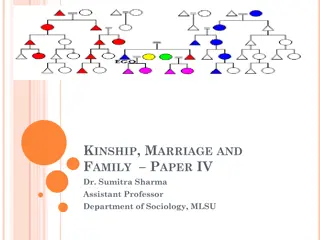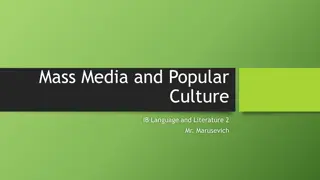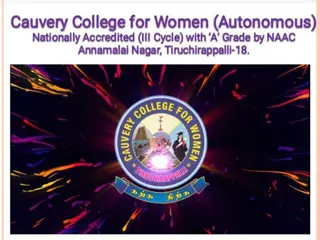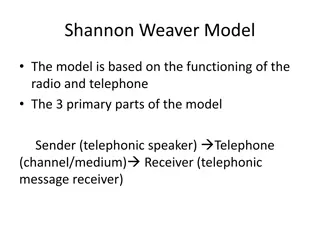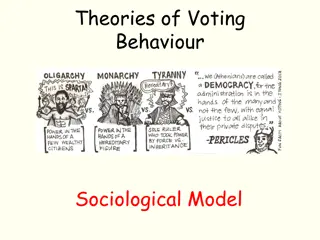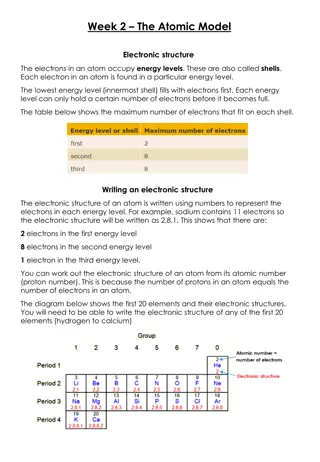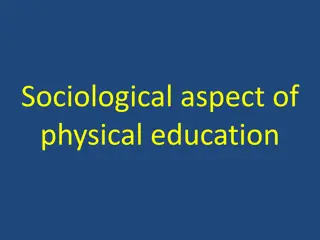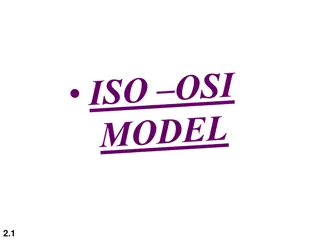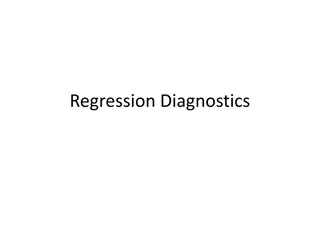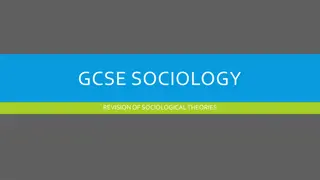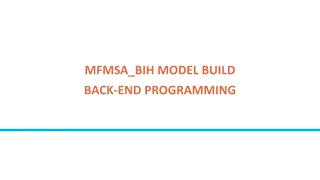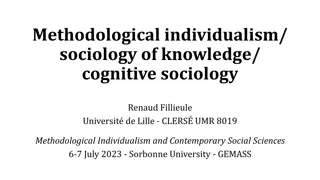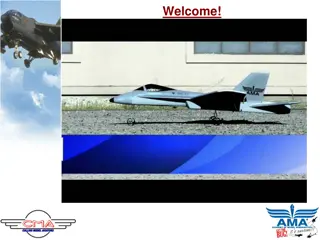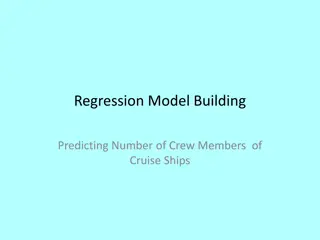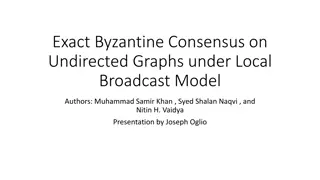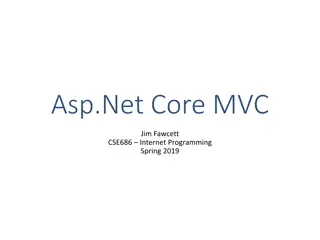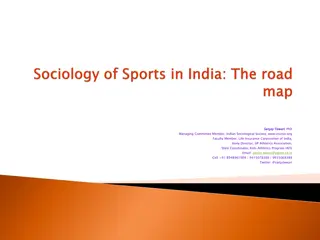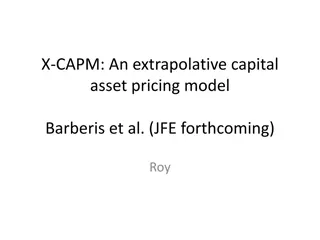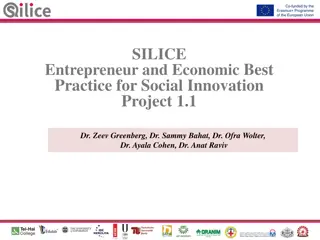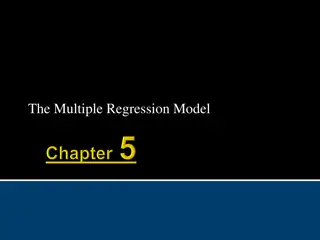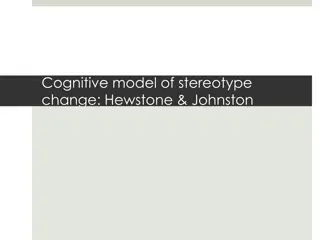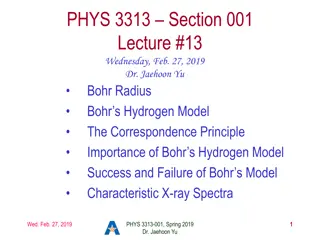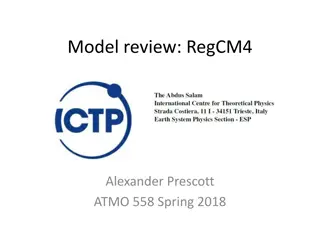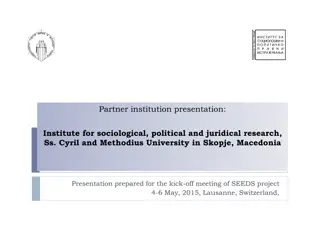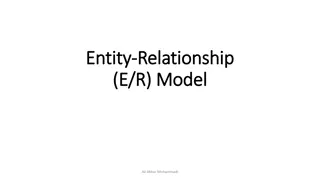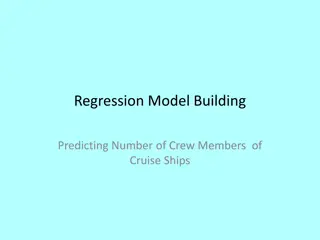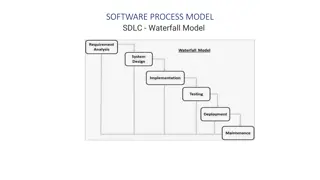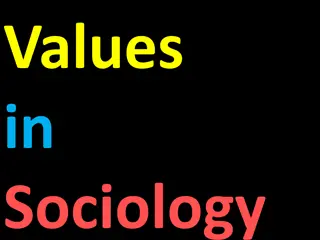Building a Macrostructural Standalone Model for North Macedonia: Model Overview and Features
This project focuses on building a macrostructural standalone model for the economy of North Macedonia. The model layout includes a system overview, theory, functional forms, and features of the MFMSA_MKD. It covers various aspects such as the National Income Account, Fiscal Account, External Accoun
2 views • 23 slides
NAMI Family Support Group Model Overview
This content provides an insightful introduction to the NAMI family support group model, emphasizing the importance of having a structured model to guide facilitators and participants in achieving successful support group interactions. It highlights the need for a model to prevent negative group dyn
6 views • 23 slides
Explore Anthropology and Sociology at Our Department
Anthropology and Sociology departments offer culturally relevant classes addressing key societal issues such as race relations, health, migration, and more. Meet our renowned faculty members specializing in various anthropological and sociological fields of study. From urban anthropology to gender i
3 views • 17 slides
Understanding Kinship, Marriage, and Family: Key Concepts and Readings
Explore the intricate web of social relationships that define kinship, marriage, and family structures in human societies. Delve into basic concepts such as consanguinity and affinity, kinship terminology, marriage rules, family composition, and changing patterns in India. Essential readings by reno
0 views • 12 slides
Understanding Mass Media and Popular Culture: The Role, Influence, and Sociological Theories
Mass media encompasses various forms of communication that reach a broad audience, influencing culture and shaping perceptions of celebrity. Sociological theories, such as Limited Effects Theory and Culturist Theory, explain how media interacts with society. Popular culture refers to widely consumed
5 views • 9 slides
Understanding Entity-Relationship Model in Database Systems
This article explores the Entity-Relationship (ER) model in database systems, covering topics like database design, ER model components, entities, attributes, key attributes, composite attributes, and multivalued attributes. The ER model provides a high-level data model to define data elements and r
0 views • 25 slides
Communication Models Overview
The Shannon-Weaver Model is based on the functioning of radio and telephone, with key parts being sender, channel, and receiver. It involves steps like information source, transmitter, channel, receiver, and destination. The model faces technical, semantic, and effectiveness problems. The Linear Mod
0 views • 8 slides
Theories of Voting Behaviour and Sociological Models in Political Science
The analysis of voting behavior, also known as "psephology," delves into long-term influences like class and party loyalty, contrasting with more short-term factors such as political issues and media impact. While the Sociological Model focuses on class and party loyalties, there is a discrepancy be
0 views • 24 slides
Understanding Sociological Theories and Frameworks
Sociological theories, encompassing micro and macro perspectives, provide a lens to interpret societal dynamics. Consensus theories like functionalism emphasize shared norms, while conflict theories such as Marxism highlight social inequalities. Social action theories like interactionism focus on in
3 views • 21 slides
Understanding Atomic Structure: Electrons, Energy Levels, and Historical Models
The atomic model describes how electrons occupy energy levels or shells in an atom. These energy levels have specific capacities for electrons. The electronic structure of an atom is represented by numbers indicating electron distribution. Over time, scientists have developed atomic models based on
0 views • 5 slides
Understanding ROC Curves and Operating Points in Model Evaluation
In this informative content, Geoff Hulten discusses the significance of ROC curves and operating points in model evaluation. It emphasizes the importance of choosing the right model based on the costs of mistakes like in disease screening and spam filtering. The content explains how logistical regre
7 views • 11 slides
Exploring the Sociological Aspect of Physical Education and Sports
Understanding the sociological aspect of physical education and sports involves delving into the study of human relationships, social interactions, group dynamics, and societal influences within the realm of sports and athletic activities. Sports sociology plays a crucial role in changing outlooks,
0 views • 9 slides
Understanding the OSI Model and Layered Tasks in Networking
The content highlights the OSI model and layered tasks in networking, explaining the functions of each layer in the OSI model such as Physical Layer, Data Link Layer, Network Layer, Transport Layer, Session Layer, Presentation Layer, and Application Layer. It also discusses the interaction between l
1 views • 41 slides
Regression Diagnostics for Model Evaluation
Regression diagnostics involve analyzing outlying observations, standardized residuals, model errors, and identifying influential cases to assess the quality of a regression model. This process helps in understanding the accuracy of the model predictions and identifying potential issues that may aff
1 views • 12 slides
Sociological School of Jurisprudence: An Introduction
Sociology studies human relations within society while jurisprudence focuses on law. The Sociological School of Jurisprudence emphasizes the interconnection between law and society. It emerged in response to the doctrine of Laissez Faire during the Industrial Revolution, advocating for a balance bet
1 views • 6 slides
Exploring Mass Observation: A Sociological Movement in Bolton
Delve into the intriguing world of Mass Observation, a sociological movement founded in 1937, focusing on the working classes in Bolton. The movement collected vast amounts of documentary records covering various aspects of life, including pubs, sports, politics, and more. Discover the unique Bolton
0 views • 16 slides
Understanding Sociological Theories for GCSE Sociology Revision
Explore key sociological theories including Marxism, Functionalism, Feminism, and Interactionism. Understand how these theories interpret society and influence social dynamics. Engage in interactive activities like the Gingerbread Theory to apply concepts creatively. Discover main key studies by sch
0 views • 5 slides
MFMSA_BIH Model Build Process Overview
This detailed process outlines the steps involved in preparing, building, and debugging a back-end programming model known as MFMSA_BIH. It covers activities such as data preparation, model building, equation estimation, assumption making, model compilation, and front-end adjustment. The iterative p
0 views • 10 slides
Exploring Methodological Individualism in Sociology of Knowledge
Delve into the concept of methodological individualism within the sociology of knowledge, as scholars like Renaud Fillieule and Raymond Boudon emphasize the importance of understanding collective beliefs through the lens of individualistic methodology. Classical works by Robert Merton further enrich
0 views • 24 slides
Proposal for Radio Controlled Model Aircraft Site Development
To establish a working relationship for the development of a site suitable for radio-controlled model aircraft use, the proposal suggests local land ownership with oversight from a responsible agency. Collins Model Aviators is proposed as the host club, offering site owner liability insurance throug
0 views • 20 slides
UBU Performance Oversight Engagement Framework Overview
Providing an overview of the UBU Logic Model within the UBU Performance Oversight Engagement Framework, this session covers topics such as what a logic model is, best practice principles, getting started, components of the logic model, evidence & monitoring components, and next steps. The framework
0 views • 33 slides
Regression Model for Predicting Crew Size of Cruise Ships
A regression model was built to predict the number of crew members on cruise ships using potential predictor variables such as Age, Tonnage, Passenger Density, Cabins, and Length. The model showed high correlations among predictors, with Passengers and Cabins being particularly problematic. The full
0 views • 16 slides
Exact Byzantine Consensus on Undirected Graphs: Local Broadcast Model
This research focuses on achieving exact Byzantine consensus on undirected graphs under the local broadcast model, where communication is synchronous with known underlying graphs. The model reduces the power of Byzantine nodes and imposes connectivity requirements. The algorithm involves flooding va
0 views • 7 slides
Calibration of Multi-Variable Rainfall-Runoff Model Using Snow Data in Alpine Catchments
Explore the calibration of a conceptual rainfall-runoff model in Alpine catchments, focusing on the importance of incorporating snow data. The study assesses the benefits of using multi-objective approaches and additional datasets for model performance. Various aspects such as snow cover, groundwate
0 views • 16 slides
Understanding Asp.Net Core MVC - Building Web Applications with Model-View-Controller Pattern
Asp.Net Core MVC is a framework for building web applications based on the Model-View-Controller pattern. The model manages application data and constraints, views present application state, and controllers handle requests and actions on the data model. Learn about the MVC structure, life cycle, mod
0 views • 22 slides
Exploring the Sociological Perspective of Sport and Development
Over the past decade, there has been a significant emphasis on using sport as a tool for development. This includes promoting physical health benefits, social integration, and inclusiveness. The concept of development has evolved beyond mere economic growth to encompass social, cultural, and politic
0 views • 53 slides
Understanding X-CAPM: An Extrapolative Capital Asset Pricing Model
This paper discusses the X-CAPM model proposed by Barberis et al., which addresses the challenges posed by investors with extrapolative expectations. The model analytically solves a heterogeneous agents consumption-based model, simulates it, and matches various moments. It explores how rational inve
0 views • 23 slides
Innovation and Social Entrepreneurship Initiatives in Higher Education
This project focuses on establishing a leading center for promoting innovation and social entrepreneurship within higher education institutions. It aims to encourage students and staff to develop creative solutions for community challenges, expand social involvement, and foster sustainable positive
0 views • 13 slides
Principles of Econometrics: Multiple Regression Model Overview
Explore the key concepts of the Multiple Regression Model, including model specification, parameter estimation, hypothesis testing, and goodness-of-fit measurements. Assumptions and properties of the model are discussed, highlighting the relationship between variables and the econometric model. Vari
1 views • 31 slides
Cognitive Model of Stereotype Change: Three Models Explored
The Cognitive Model of Stereotype Change, as researched by Hewstone & Johnston, delves into three key models for altering stereotypical beliefs: the bookkeeping model, the conversion model, and the subtyping model. These models suggest strategies such as adding or removing features to shift stereoty
0 views • 58 slides
Understanding Bohr's Model of the Hydrogen Atom
Exploring the significance of Bohr's hydrogen model in physics, this lecture delves into the Bohr radius, the correspondence principle, and the success and limitations of his model. Discover how characteristic X-ray spectra contribute to our understanding of atomic structures, leading to the conclus
0 views • 14 slides
Overview of RegCM4 Model Features
RegCM4 is a community model developed since the 1980s, with over 800 scientists contributing to its advancements. It features a fully compressible, rotating frame of reference and a limited area dynamical core based on the Penn State/NCAR Mesoscale Model 5 (MM5). The model uses hydrostatic and nonhy
0 views • 14 slides
Institute for Sociological, Political, and Juridical Research (ISPJR) at Ss. Cyril and Methodius University in Skopje, Macedonia
The Institute for Sociological, Political, and Juridical Research (ISPJR) at Ss. Cyril and Methodius University in Skopje, Macedonia, established in 1965, is a prominent public university research institution in the social sciences. ISPJR conducts scientific and applied research projects, offers pos
0 views • 8 slides
Understanding Entity-Relationship Model in Databases
The Entity-Relationship Model (E/R Model) is a widely used conceptual data model proposed by Peter P. Chen. It provides a high-level description of the database system during the requirements collection stage. Entities represent things of independent existence, each described by a set of attributes.
0 views • 21 slides
Predicting Number of Crew Members on Cruise Ships Using Regression Model
This analysis involves building a regression model to predict the number of crew members on cruise ships. The dataset includes information on 158 cruise ships with potential predictor variables such as age, tonnage, passengers, length, cabins, and passenger density. The full model with 6 predictors
0 views • 15 slides
Understanding Model Bias and Optimization in Machine Learning
Learn about the concepts of model bias, loss on training data, and optimization issues in the context of machine learning. Discover strategies to address model bias, deal with large or small losses, and optimize models effectively to improve performance and accuracy. Gain insights into splitting tra
0 views • 29 slides
Analysis of Multi-Wall Penetration Loss Model for HEW System-Level Simulation
In December 2014, a multi-wall penetration loss model for HEW system-level simulation was proposed by Kejun Zhao, Yunxiang Xu, and Xiaoyuan Lu from the National Engineering Research Center for Broadband Networks & Applications. The model provides more accurate calculations of penetration loss in ind
0 views • 11 slides
Understanding the Waterfall Model in Software Development
The Waterfall Model is a linear-sequential life cycle model for software development. In this model, each phase must be completed before the next can begin, without overlaps. The sequential phases include Requirement Gathering, System Design, Implementation, Integration and Testing, Deployment, and
0 views • 7 slides
Exploring Values in Sociology: A Critical Analysis of Objectivity and Subjectivity
Delve into the complex interplay between objectivity and subjectivity in sociology, examining whether true value-free research is achievable. Classical sociologists like Comte, Durkheim, and Marx are scrutinized for their perspectives on the role of values in sociological inquiry, challenging the no
0 views • 17 slides
MSc Public Sociology: Fostering Sociological Skills for Social Impact
The MSc Public Sociology program at the University of Northampton aims to advance the study of social issues, enhance communication skills for engaging in public debates, apply sociological knowledge to address complex problems, and develop diverse transferable skills. It emphasizes the use of media
0 views • 6 slides



